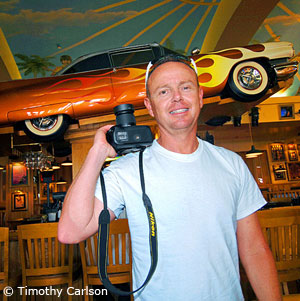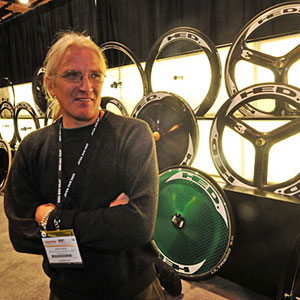The distinguished Delly Carr
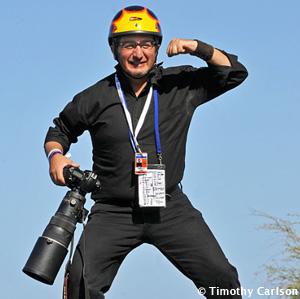
Australian sports photographer Delly Carr has been around the triathlon world for quite some time now and his images are truly stunning. The humble Aussie recently was bestowed a great honor and we had a few words with him.
Slowtwitch: Delly thanks for the chat.
Delly: No Herbert, I should be thanking you. This is very cool.
ST: You received a big honor recently. Can you share?
Delly: I was bestowed a big honor last year by being asked to be part of The World Photography Academy, and then to help judge and present at the World Photography Awards in Cannes. I was, and still am, the only Australian Freelance Photographer to be part of that Academy. Names like Elliot Erwitt, Nan Goldin, Tom Stoddart, Elliot Landy, Phil Stern, and Neil Leifer are amongst that Academy. I was chosen due to my reputation, my years of experience, and mostly due the respect, contribution and goodwill I have made within the Australian Photography scene. To be recognized by peers is a heartwarming honor.
ST: You said before that you consider yourself an armchair athlete. Why then the focus on sports photography?
Delly: I am lucky that my passion is my job. So work isn’t really much of a chore. But yes, photographing something that you really like, makes it ever more appetizing and sweet. So shooting sport is a big adrenaline rush for me. And by knowing sport allows me the comfort of being part of the play, allowing me to react quickly to the peak action, allowing me to anticipate a key movement before it happens, and giving my ‘photographic eye’ time to relax and see new opportunities. And 99% of the time, being in ‘the right place at the right time’ has happened because you had some knowledge of the sport and anticipated it. That makes a great sports photographer stand out from the rest.
ST: Can you take us back how you got involved with photography in the first place?
Delly: Quite by accident. As a teenager I wasn’t allowed to play sports in high school for a few years due to having teeth braces. Wanting to be with my rugby mates I conned the sports master to allow me to take action photographs of the rugby teams for the school newsletter so in order that I could be with them. My passion for sports photography was born. But I continued on my study path and went into university, completed my economics degree, and worked in the corporate world for 6 years or so. The company experienced a sales downturn, offered voluntary retrenchment packages, and I left with some money in my pocket and with my single-minded aim to become a fulltime sports photographer. That was 22 years ago, and I can say that I am now blessed in having my hobby as my work profession.
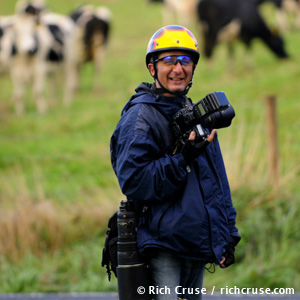
ST: Which other photographers did you idolize as you started to finesse your craft?
Delly: Neil Leifer, a USA sports legend. He was blessed to work and photograph sporting icons like Jack Nicklaus and Ali, and his photographs do nothing but reinforce that these sporting legends were just that, icons. Eammon MCabe, a British photographer who looked at sports differently than anyone else working in the press at that time. He used light and the textural qualities of Black and White to its fullest potential. His images let me know that there was beauty to be found in sports. Sebastiao Selgado – His ‘Workers’ exhibition in Sydney quite a few years ago opened my eyes to how the world can be perceived through the lens. It taught me just how beautiful and powerful an art form that photography can be in the hands of the right person. And it is that which I strive for each day of my work.
ST: It appears most sport shooters in triathlon use Canon cameras, but you are a Nikon man. Is that just something you grew up with?
Delly: I use Nikon pro gear, and have for my 22 years of shooting. From Day 1 Nikon has provided me with solid dependable equipment, an absolute must for the rough and tumble world of freelance sports photography. Sports photography needs hard wearing, fast reacting, and dependable equipment. But the funny thing is that the main reason I chose my first Nikon camera is because it felt solid and true in my hand. It felt a part of me.
And I am happy that I have been true to Nikon, for they are the world market leaders on this present day. And they recently rewarded me for my loyalty appointing me the sole Nikon Ambassador of Sport Photography in Australia. That was very cool.
ST: Do you still shoot film on occasion or are working completely digital now?
Delly: In my world, it is all about digital. Sadly film is long gone. But give me a roll of film over working on a computer any day.
ST: Do you carry the same amount of camera gear for most races you attend?
Delly: Pretty much so … My current kit consists of 2 pro Nikon bodies, a 600mm lens, a 300mm, 80-200mm zoom, 24-70mm, a 14-28mm zoom, a 16mm fisheye, flash, and a multitude of digital cards. And a trolley to cart it all around! My shoulders and knees are in bad shape having to have carry and support 25 kilos of gear for all of these years.
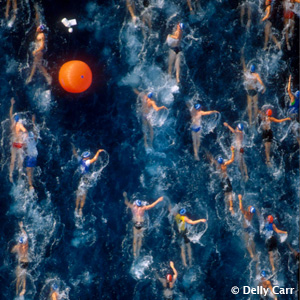
ST: What is the most memorable triathlon image you took?
Delly: Ten years or so ago, I was headed for Ironman Kona and wanted to do something different. I had shot the swim start from the same position on the pier year after year after year. I saved my pennies and hired a helicopter for an hour, and it cost me a bomb. But no photographer had shot the start from 500feet above. It gave the most amazing perspective of sport amongst the deep blue Hawaiian ocean. The image with the orange buoy was used worldwide and often, and has since become one of those iconic Triathlon images.
The pieces of work I am most proud of are those that I have had some significant input into getting that shot. The best sports pictures are those where there is a bit of the photographer with in. It could be some forethought, some vision, an effort beyond what is the norm. An emotion, or a part of the photographer's personality. When that photo comes off, then that image will make you proud. My world is about moments – quick fleeting moments that are otherwise missed but brought into existence by the physical photograph. And the moments are many, the moments are quick, and the moments all exist with a different biology to each other. The biology is determined by the vision and portrayal that I judge as being part of its outer skin. I try to put a little of my own self into the grand vision, and ultimately the exhibition of that captured moment.
ST: What about the picture that “got away?” Surely there are images that you wanted to take and either had no more card space, dead battery or another issue. Is there a time and place for such a trouble that you remember the most?
Delly: My funniest story would be way be back in my early days in the sport (and much younger then) where I went from the sunrise closing of a nightclub (and with quite a few beers consumed) to the start of an early morning race. It was the days of film, not digital. I started firing shots at the swim start, and it wasn’t until halfway through the bike leg that I realized that the roll of film I had loaded was quite a long one. I had fired over 200 frames, when film was only 36 exposures long! It then occurred in my cloudy mind that I hadn’t even loaded a roll of film!
ST: The photography world has changed quite a bit from when you started. I believe you have strong thoughts along those lines.
Delly: Yes I do. Photography has advanced but has it really improved my world? The answer is a big fat NO. I had dinner the other week with a photographer who assisted Bailey, assisted Morley and photographed Twiggy in London in the 60's. And then it was clear just how far away that his generation has drifted from what was then to what is now. What has changed? It’s how photography is perceived. And we must thank (or not) the digital revolution for that.
The Digital revolution has allowed photography to be rediscovered and reinvented. It has evolved and taken the same rollercoaster ride like most instruments of this revolution. Photographs are being shared more now, and they are viewed by more eyes than ever before. There are more photographs in this world then there are bricks. So photography has become more disposable. There have been a handful of Triathlon magazines starting up worldwide in the past 12 months. They have all contacted me. And do you know that each one of these magazines have started out with not one budget dollar allocated to photography!! Can you honestly believe that? They ask for images for a photo credit only. People are starting magazines thinking that photography is a free commodity. And then they don’t realize by having no money to pay for photography, then photographers like me will go and work in another field of photography or start flipping burgers at McDonalds. Their actions actually have a negative effect. By having no money for photos means that some day there will be no photographers and therefore no photos to purchase anyway (or to get for free). Poor quality images on the pages make the magazine less attractive to buy, lower circulations, and therefore lower advertising revenue that they need to survive. So their actions will eventually implode on them.
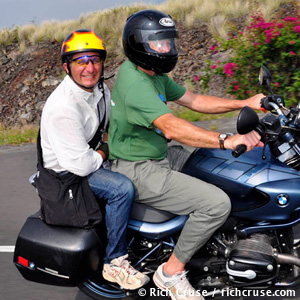
ST: Well Delly, then you must also have concerns about triathlon websites. While stuff seems to be online forever, the stories are moving quickly from the front page. Is that tough for you to handle?
Delly: I am a little old school and still prefer to have a printed magazine in my hand. But online triathlon websites are the perfect tool for news stories. I don’t have the same issues with websites as I have had lately with magazines and their ignorance of good photography (not all of them, just some). Online sites are using photography to their maximum to make the site pretty and therefore attracting the traffic they need to survive. And many sites have online race photo portfolio galleries, so that's a nice thing for the photographer.
ST: Which other tri shooters do you respect?
Delly: In my world I have two heroes, Jero Honda (Japan) and good friend Rich Cruse (USA). Jero began shooting the sport a few years before me, and he had such a soft romantic eye. His work quickly told me that there was beauty grace and form in the sport of triathlon. And that is my mantra to shooting each race I go to. Then there is Rich … one of the most technically perfect and hard working tri shooters out there. He shoots so solid and true, and I have the ultimate respect for the way he sees it. And we are the best of mates.
There is also a photographer in Hungary, Janos Schmidt. He has an eye similar to mine. So I get a kick out of what he does. I have the ultimate respect for every snapper out there. Triathlon is the prettiest and most beautiful sport on the planet, and the current band of photographers (Phillips, Carlson, Farrow, etc etc) who are out there week after week know that in their heart. For that reason alone that makes them great visionary photographers.
ST: What events are on your schedule for 2010?
Delly: I am a big fan of the ITU World Championship Series. It is indeed the pinnacle of the sport on the planet. It is the only series of races that puts the sport in front of the public, the media, the IOC, and the sports stage. So I will be at each race of the year. And then there is the Youth Olympic Games in Singapore. That will be another exciting few days of racing.
ST: So do you have any predictions on who will win the ITU WCS series?
Delly: Well Alistair Brownlee just showed us in Madrid what an absolute freak he is. He smashed the men’s field despite his 8-month injury layoff and it was his first race back. He looks unbeatable right now. The girls Series is a tough one to answer. I haven’t seen such an evenly and fiercely contested women’s series ever. But I'll let my Aussie favoritism slide in here and call it an Emma Moffatt or Emma Snowsill World Championship Series.
ST: What about Kona?
Delly: Chrissie Wellington will win the women’s. Sadly for the competition, no one looks close to matching her potential. The men’s … easy choice for me … Crowie. Aussie Aussie Aussie Oi Oi Oi.
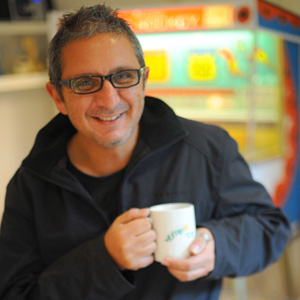
ST: What other sports do you enjoy?
Delly: People will laugh at this question because they think Triathlon is all I do. But nothing can be further away from the truth. I am Swimming Australia’s official photographer, shooting household names in Australia and the world. I have shot Cricket for 16 consecutive summers. I have a bucketful of football work, or as we Aussies know it, Soccer. Kayaking, canoeing, beach volleyball, and mountain biking are others I have regular work in. And then there is corporate sports work for sports clients like Gatorade, Orca, Foxsports, Shimano, Oakley, and the Bradman Foundation.
ST: What music do you like?
Delly: When you put my CD / iTunes collection in a pile, it is indeed a mish mash of genres and periods. But if I have to put it all down in one sentence, it would be Beatles, Led Zeppelin, Metallica, and the Rolling Stones.
ST: What was the last book you read?
Delly: I’m a photographer!!!! I don’t read books… I just look at the pictures!
ST: Where do you see yourself in 5 years?
Delly: With a lot more gray hair, but also looking a lot more distinguished. I do hope however that I am able to be in some sort of role within the Australian photography scene that can show the world that photography is still an art form and an object of beauty and discussion. Whether it be a gallery owner or a photography festival director or some sort of ambassador/mentor, well who knows? But I now have the Yoda wisdom and guidance to put something back and perhaps save a profession that could gurgle down a drain.
ST: Is there anything else we should know about you?
Delly: I laugh because I’m naturally a shy and private person, but here goes … I like collecting old pinball machines, I have never read a Harry Potter Novel, nor have I ever been able to complete a crossword puzzle.
For more on Delly Carr and his great work visit sportsphotography.com.au


